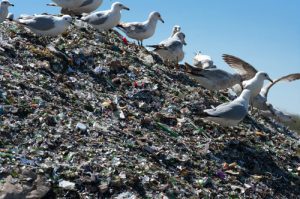Seagulls, Garbage Dumps and Rooftops!
By Chris Williams on April 27, 2012.
We have long known that seagulls eat putrid landfill food. When you see a circling, swirling flock of seagulls inland, they’re often hovering above a landfill waiting for a chance to land and peck at piles of garbage. The numbers of seagulls have been increasing in many areas and experts attribute that increase to an increase in human garbage. Gulls that traditionally live near water and feed on fish have developed a taste for old chicken bones and moldy French fries. Young seagulls that in the past may not have been able to compete with adults for fish are able to survive thanks to the easy pickings at landfills.
 One research study of a group of landfill-visiting gulls, found that their foraging habits changed during the breeding season. The researchers figured that the gulls’ visits to the dump for fast food leftovers would increase during breeding when the gulls had higher energy demands. Instead, they were surprised to find that the breeding gulls shunned the landfill food and instead opted to catch freshwater fish, a higher quality food. But, alas, their good eating habits didn’t last long. When the first chicks started to leave the nest, the gulls started to return to the landfills where they could feast on easy pickings again: chicken bones, French fries, ribs, and other fast food garbage. Sound all too familiar? Sometimes you just don’t feel like going through all the work of putting together a nutritious meal. Fast food is just easier.
One research study of a group of landfill-visiting gulls, found that their foraging habits changed during the breeding season. The researchers figured that the gulls’ visits to the dump for fast food leftovers would increase during breeding when the gulls had higher energy demands. Instead, they were surprised to find that the breeding gulls shunned the landfill food and instead opted to catch freshwater fish, a higher quality food. But, alas, their good eating habits didn’t last long. When the first chicks started to leave the nest, the gulls started to return to the landfills where they could feast on easy pickings again: chicken bones, French fries, ribs, and other fast food garbage. Sound all too familiar? Sometimes you just don’t feel like going through all the work of putting together a nutritious meal. Fast food is just easier.
Like pigeons, seagulls readily adapt to city living. They like to make themselves at home on flat rooftops, especially the large rooftops of warehouses. And guess what, they especially like flat rooftops that are just a short hop from the nearest landfill. In Ohio, one warehouse rooftop became home to 1,100 gulls that foraged almost exclusively at the nearby sanitary landfill. It was determined that the gulls carried an amazing 160 pounds of chicken and rib bones to the rooftop each week!
Seagull droppings are especially damaging to parked cards, commercial signs, city statues, boat yards and rooftops. Gulls can contaminate food with droppings in outdoor restaurants and sidewalk or rooftop cafes.
While seagulls can be a nuisance and even a safety hazard, they are protected by federal law. When seagulls require control, a pest control company that is licensed and specializes in bird control must be contacted. That company may need to obtain permits from federal and state officials. Seagulls can be dissuaded from roosting on rooftops, statues and other sites with the use of various chemical or mechanical repellents, or exclusionary devices that do not require killing the birds. If your building or business is having a problem with seagulls, give Colonial a call. We do pests so you don’t have to.